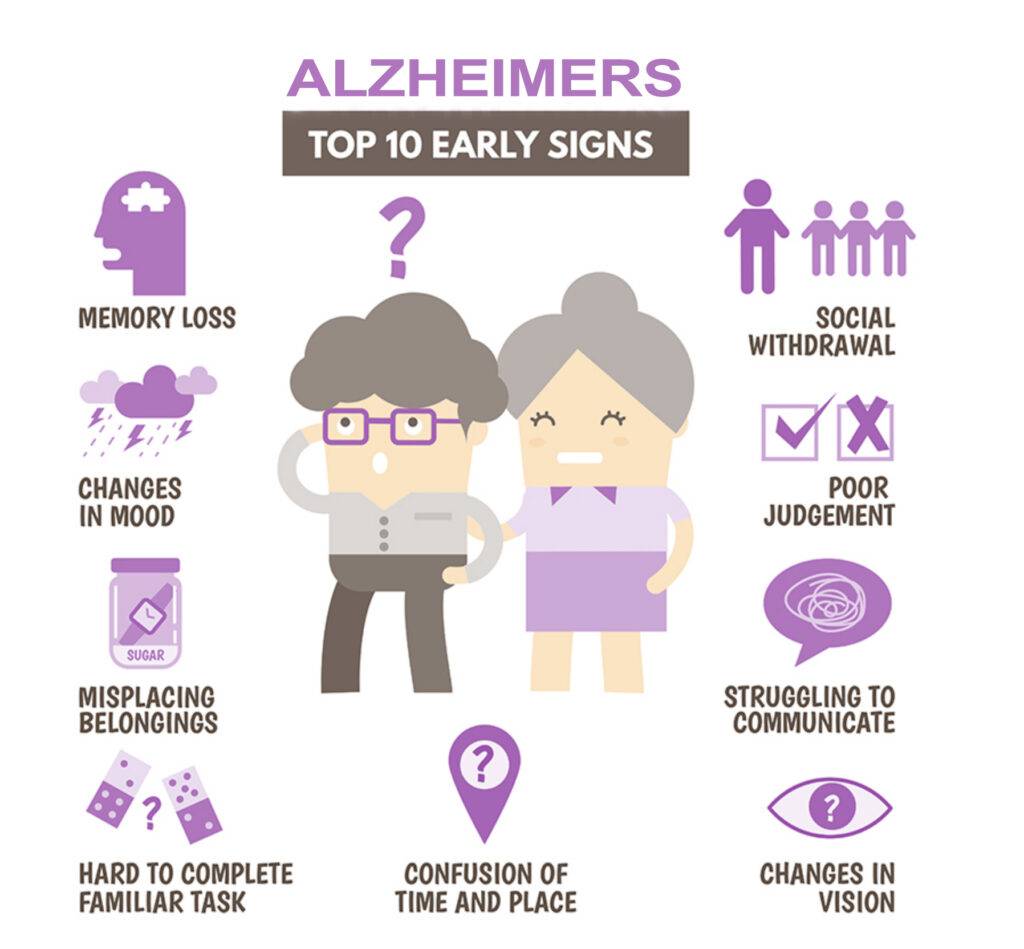Alzheimer's Vs Dementia | The 7 Stages of Alzheimer's & It's Risk Factors
Have you ever walked into your room and forgotten why you went in there in the first place? It is a shared experience that happens to everyone. Still, forgetfulness can become a more severe problem for some older adults. Alzheimer’s disease and Dementia are two conditions that can cause memory loss, confusion, and other cognitive problems that can make daily life challenging. While they might sound like scary diseases, the good news is that there are things you can do to reduce your risk and manage the symptoms if you or a loved one is affected.

In this article, we’ll look closer at Alzheimer’s and Dementia, including what they are, what causes them, and what you can do to stay healthy and happy as you age. We’ll also explore the different types of Dementia, their diagnosis, and the latest research on treatments and potential cures.
Whether you are a senior citizen wanting to maintain your cognitive health, a caregiver who wants to provide the best care for a loved one, or just someone curious about these conditions, this article is for you. So, let’s dive in and learn more about Alzheimer’s disease and Dementia.
Alzheimer's V/S Dementia and the differences between the two:
Alzheimer’s V/S Dementia has always been debated for a long time. Although Alzheimer’s and Dementia are terms used side by side and are often used interchangeably, there’s much difference between the two.
Dementia describes an overall decline in memory and other cognitive skills severe enough to reduce a person’s ability to perform everyday activities. The progressive and persistent deterioration of cognitive function characterizes it. Affected patients often have memory loss and a partial or significant lack of insight into their deficits. (1)
Alzheimer’s disease (AD) is the commonest type of Dementia, accounting for at least two-thirds of cases of Dementia in people aged 65 and older. Alzheimer’s is a neurodegenerative disease with insidious onset and progressive impairment of behavioral and cognitive functions, including memory, comprehension, language, attention, reasoning, and judgment. It is the 6th leading cause of death in the United States of America. So, Alzheimer’s V/S dementia is a quite an interesting topic in the healthcare field.
Factors that Increase the Likelihood of Alzheimer's and Dementia:
In order to treat or prevent a disease, we ought to know the underlying cause and the risk factors which actually lead to the disease. If you open your fridge door and forget what you wanted or you go to your room to fetch something, and you scratch your head because you cannot remember why you went there, it might not be as serious at a young age as it may be if you are old or have a positive family history for Dementia. As much as the name ‘Dementia’ is scary, it may not be as serious as it may sound.
Alzheimer’s disease is a complex condition that can tiptoe on you over time, but there are a bunch of things that make it more likely to happen. First off, the older you get, the higher the chances of developing it, especially after 65.
A positive family history of Alzheimer’s can increase your chances of getting it yourself. This is especially true if you’ve got a first-degree relative (like a parent or sibling) with the condition. But don’t freak out – having a family history of Alzheimer’s isn’t a guaranteed sentence.
Plus, if you’ve got any wobbly genes (like the APOE ones), you’re more likely to develop it too. But it’s not always out of your control – things like eating well, exercising, and getting good sleep can help. And if you’ve got high blood pressure, cholesterol, or type 2 diabetes, watch out – those can all up your chances of getting Alzheimer’s. It’s good to keep an eye out for these factors so you can lower your chances of getting hit with Alzheimer’s disease.
Is Early Diagnosis of Alzheimer's Possible?
The only definitive and conclusive way to diagnose Alzheimer’s is to carry out a brain autopsy of the patient’s brain tissue and ascertain whether the subject has Alzheimer’s or any other form of Dementia. However, due to the non-feasibility of such methods, to diagnose and conclude the conditions, medical practitioners use tests that examine a patient’s mental ability. (2)
Another way Alzheimer’s or Dementia can be assessed is by taking a history of the patient’s memory. To diagnose Alzheimer’s disease early, doctors often speak with both the patient and their relatives and friends to get a full picture of what’s going on. This is because Alzheimer’s can show up in many ways, like changes in behavior, irritability, getting lost in familiar places, becoming more aggressive, silent, or withdrawn, and having trouble with tasks that used to be easy or forgetting learned motor skills. It can also cause memory loss and trouble with communication, leading to problems with independence and self-care. By talking to everyone involved, doctors can better understand what’s happening and whether Alzheimer’s might cause these symptoms.
There is no cure for Alzheimer’s, although treatments available may improve some symptoms. (3)
Alzheimer's Stages:
For reaching a proper diagnosis and initiating a fruitful treatment or preventing the progression of forgetfulness or Dementia, it is important to note the patient’s symptoms. However, as Alzheimer’s affects each individual differently, the diversity of symptoms may sometimes be misleading.
Symptoms of Alzheimer’s, most importantly Dementia, can occur in various patterns or may be present on and off. There are seven Alzheimer’s stages that help diagnosticians better cope with the patient’s health. These seven stages are as follows:
Stage of No Symptoms:
This is a Grade One disease when the patient does not show any symptoms, and the cognitive abilities of the brain are normal.
Stage of Mild Forgetfulness:
This early stage almost completely resembles normal age-related forgetfulness. A person may forget the names of his relatives or car keys in the room but can still have a normal social life.
Stage of Noticeable Memory Deficit:
At this stage, the individual may have difficulty remembering recent events, planning and organizing tasks, and concentrating on complex activities. They may also experience difficulties with articulation and language, such as finding the right words to express.

Stage of More than Memory Loss:
This stage can last for many years, and your loved one may experience major difficulties with memory. However, they may still be able to recall important details about their life, such as their spouse’s name or where they live. There are also changes in behavior, sleep patterns, and an increased tendency to get lost.
Stage of Decreased Independence:
In this stage, your loved one will likely have trouble remembering people that are important to them, such as close family and friends. They become dependent on others, so you might have to check up on them occasionally.

Stage of Severe Symptoms:
At this stage, the individual’s cognitive deficits become even more pronounced, and they may no longer be able to communicate effectively or recognize familiar faces. They may also experience physical limitations, such as difficulty with walking or standing. They increasingly depend on others.
Stage of Decline of Physical Control:
At this final stage, the individual is completely dependent on others for all activities of daily living and may no longer be able to swallow, speak, or control bodily functions. Your loved one’s body may begin to shut down as their mind struggles to communicate and delegate tasks effectively.
Relationship Between Dementia and Alzheimer's Disease:
Dementia, or more commonly forgetfulness, isn’t a normal part of getting old. It happens when brain cells get messed up and have trouble communicating with each other. This can make thinking, acting, and feeling different.
Alzheimer’s disease is the most common type of Dementia and is by no means an inevitable consequence of aging (4). Alzheimer’s is a slowly progressing brain disease that worsens over time, messing up more cells and causing more memory problems. One of the first things to go is the ability to remember new stuff since the part of the brain that learns new things is usually the first to get hit.

Early Signs and Symptoms of Dementia and Alzheimer’s:
Memory loss is among the commonest early signs of Alzheimer’s and Dementia. However, it is only significant when memory loss becomes a consistent problem that it should be a cause for concern.
Another early sign of Dementia and Alzheimer’s disease is difficulty with everyday tasks, like cooking or cleaning. You may notice that your loved one is struggling with things that used to come easily to them.
Confusion is another common early sign of Dementia and Alzheimer’s disease. Mood changes are also a common early sign of Dementia and Alzheimer’s disease. Your loved one may become more agitated or anxious than usual.

Finally, poor judgment is another early sign of Dementia and Alzheimer’s disease. You may notice your loved one making decisions out of character or putting themselves in dangerous situations.
Apathy and depression are the most common overall. Apathy is associated with high symptom severity, likely because of its greater persistence. Symptoms such as agitation, aggression, hallucinations, and delusions may be especially distressing and dangerous to patients and caregivers. (5)
Final Verdict:
After all, is said, It is absolutely crucial to know the basics about Alzheimer’s and Dementia as these are inevitable, progressive, deteriorating brain disorders mainly affecting older adults. You must speak with their doctor if you notice any of these early signs in your loved one. Early detection and treatment can make a big difference in slowing the progression of the disease and improving quality of life.
References:
- Emmady PD, Schoo C, Tadi P. Major Neurocognitive Disorder (Dementia) [Updated 2022 Nov 19]. In: StatPearls [Internet]. Treasure Island (FL): StatPearls Publishing; 2023 Jan-. Available from: https://www.ncbi.nlm.nih.gov/books/NBK557444/
- Khan, S., Barve, K. H., & Kumar, M. S. (2020). Recent Advancements in Pathogenesis, Diagnostics and Treatment of Alzheimer’s Disease. Current neuropharmacology, 18(11), 1106–1125. https://doi.org/10.2174/1570159X18666200528142429
- Kumar, A., Sidhu, J., Goyal, A., & Tsao, J. W. (2022). Alzheimer Disease. In StatPearls. StatPearls Publishing.
- De la Rosa, A., Olaso-Gonzalez, G., Arc-Chagnaud, C., Millan, F., Salvador-Pascual, A., García-Lucerga, C., Blasco-Lafarga, C., Garcia-Dominguez, E., Carretero, A., Correas, A. G., Viña, J., & Gomez-Cabrera, M. C. (2020). Physical exercise in the prevention and treatment of Alzheimer’s disease. Journal of sport and health science, 9(5), 394–404. https://doi.org/10.1016/j.jshs.2020.01.004
- Deardorff, W. J., & Grossberg, G. T. (2019). Behavioral and psychological symptoms in Alzheimer’s Dementia and vascular Dementia. Handbook of clinical neurology, 165, 5–32. https://doi.org/10.1016/B978-0-444-64012-3.00002-2
- Image from https://villagegreenalzheimerscare.com/alzheimers-disease-stages/
- Image from https://medicine.umich.edu/dept/mneuronet/news/archive/201907/early-alzheimer%E2%80%99s-disease-detection-may-benefit-new-stem-cell-therapy
- Images from https://hhs.iowa.gov/chronic-disease-prevention/alzheimers-and-related-dementias/Dementia
- Image from https://www.theoldish.com/stages-of-alzheimers-disease/

